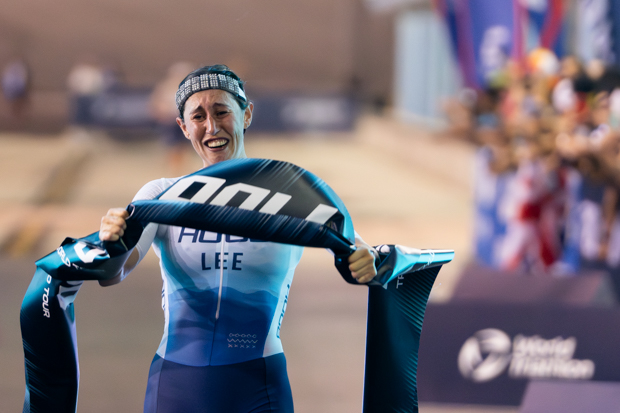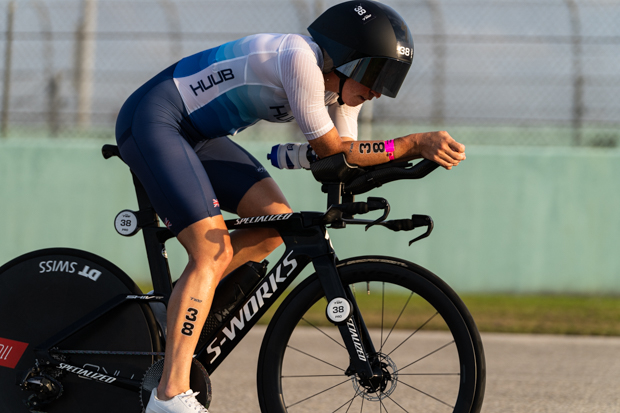
India Lee was a dark horse win at the T100 Miami this past weekend, with few podium picks including the Brit. But those who have been following Lee know that she’s racked up quite a few achievements in the sport over the past couple of years and could be poised for a dominant season.
Since 2021, Lee has collected numerous 70.3 accolades, including a third place podium spot at 70.3 Nice (2021) and second place at 70.3 Lanzarote (2023) as well as a victory at Challenge Samorin (2023) and a second place Nice-qualifying spot at Ironman Florida (2023).
Lee is often referred to for her bike prowess, but last weekend it was her run that sealed the deal for her to break the tape. About 15 minutes before the three-hour mark in the women’s race, Lee passed race leader Lucy Charles-Barclay and remained in first place until Lee crossed the finish line in first place at the 3 hour and 27 minute mark, both a smile and happy tears appearing on her face.

ST: How was your training heading into T100 Miami?
Lee: My training leading into T100 Miami was solid, but nothing special. I haven’t had any stand-out sessions, just a load of consistency. I only started “proper” structured training in the first week of January as I had some time off in December.
I went out to Lanzarote for two stints of three weeks each to get some good weather and focused training blocks. My coach Sam Proctor and I have the whole season in mind, so we hadn’t rushed fitness just to be ready for Miami - instead, we focused on plenty of foundation work to build upon throughout the year.
ST: What were your goals or thoughts heading into race day?
Lee: I had no idea where I would be fitness-wise heading into race day. The goal for Miami was to get a benchmark for where I’m at and then determine areas to both work and focus on for the next block leading into T100 Singapore.
Race strategy-wise, I wanted to have a solid swim, ride smart on the bike and not explode on the run. The run in particular was something that I was wanting to have a positive experience on; I’ve had a lot of races where I have faded badly on the run despite doing well in training. I stuck pretty rigidly to target power and pace ranges on the bike and run because I didn’t want to blow up.
ST: You mentioned in your post-race finish line interview that the swim was "boisterous" - what did you mean by that? How did you settle once on the bike, and what was going through your mind on the run knowing that it was essentially a battle between you and LCB?

Lee: In the swim, there was a line of five of us that formed right around the 200m mark. All of us were trying to get on the same feet just ahead; despite the small field we were all wanting to be in the same place and the same time - it’s just how it goes in the water. I decided to stop and go around the back of the group to get clear water on the left, which seemed to help break up our pack a bit and we got into a paceline after that.
On the bike, I settled into the rhythm of the laps quite quickly. I kept an eye on my power, and tried to take the corners quicker with each lap as I built confidence, then I used the back straightaway to recover a bit as we had a tailwind there.
On the run, I was just doing my own thing. I knew that I wanted to run a certain power and pace and would risk a blow up if I went out too hard. When I started catching up to Lucy [Charles-Barclay], that gave me confidence and a big boost, but I stayed steady and tried not to surge. When I went past Lucy, I anticipated she would probably try to tag on and it could turn into a real tough race, so I was relieved when I heard that I had a gap.
ST: What thoughts were going through your head when you made the decisive pass on Lucy Charles-Barclay?
Lee: I kept calm and focused on the rhythm of my run. The lap around the track had a bit of an uphill drag on the first half and a slight downhill on the way back towards the pit lane. I tried to kid myself I was getting a bit of recovery on the downhills. I was purely inside my own head, I knew I was doing what I could, and didn’t think about anyone else really.
ST: Finish line emotions - loved you showing every range of emotion at the finish line. What was going through your head, and is still going through your head as the champ?
Lee: I was pretty emotional at the finish line. I just couldn’t believe that I had won - I would have been thrilled with a top five finish and it’s still not really sunk in [that I won]. I’m just so proud of myself and my team. I’m so fortunate to have some close friends who were just as happy for me. Kat [Matthews] had a rough day for herself but came to the finish to greet me - that meant so much to me. The reaction from my fellow competitors has been so positive too, which also means a lot.

ST: What's on the docket for you? Any marquee or key races you're looking forward to? Any specific goals for the season other than to be in it to win it?
Lee: I’ve qualified for the Nice World Championships already, which is a course that I think will suit me - so that’s a big goal for the year.
Other than that it’ll be full focus on the T100 series. Next up is Singapore in April, so a ton of heat prep is happening between now and then. I’m not getting ahead of myself and fully appreciate that I have won one race at a time of the year when everyone is building fitness and not necessarily at their best. That being said, neither am I, so for the rest of the year it will be fun to see how everything shakes out.
ST: Who are your sponsors this year?
Lee: Huub - Huub allowed me to design my tri suit, which is the first time I’ve had that opportunity from a sponsor. I’m definitely proud of it because it’s so personal. Big thanks to them.
OTE Sports - nutrition sponsor
Specialized UK
Kings of the Wild Frontier (KOTWF) Elite Performance Coaching
I also want to give a huge shout out to my coach Sam Proctor and my manager Iain Hamilton.
ST: Bonus question: was it as dark on the track while riding as it looked on the broadcast?
Lee: It wasn’t as dark as it looked on the telly. But I did have to discard my visor for the last few laps on the bike. The benefit was that it cooled down considerably once the sun went down.
